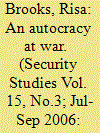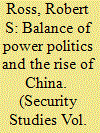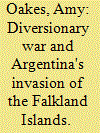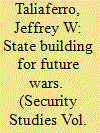|
|
|
Sort Order |
|
|
|
Items / Page
|
|
|
|
|
|
|
| Srl | Item |
| 1 |
ID:
076994


|
|
|
|
|
| Publication |
2006.
|
| Summary/Abstract |
In the June 1967 Arab-Israeli War, Egypt shocked the world with its atrocious performance in battle, only to stun the world again with its remarkable military turnaround in the October 1973 war. Existing studies, which emphasize culture, social structure, and regime type, have a difficult time explaining why this single autocratic state, in such a short period of time, exhibited such extremes in its military competence. None can explain both why Egypt performed so poorly in 1967 and improved so significantly in 1973. Other explanations such as military strategy and learning explain the puzzle in part, but they alone cannot account for the outcome. This article presents a theory that accounts for the divergence in effectiveness, focusing on underlying differences in the fabric of the autocratic regime. It argues that changes in the balance of civil-military power in the state - born from more fundamental differences in domestic politics in the autocracy - shaped three areas of military activity critical to military effectiveness: strategic assessment, command, and control, and leadership. In developing this argument, the article both contributes to growing scholarship on the sources of states' military effectiveness and explains why Egypt's performance varied so significantly in these historically consequential wars
|
|
|
|
|
|
|
|
|
|
|
|
|
|
|
|
| 2 |
ID:
076993


|
|
|
|
|
| Publication |
2006.
|
| Summary/Abstract |
Realists agree that great powers balance the military power of rising powers, but there is little agreement regarding secondary-state responses to rising powers. First, there are differences regarding whether secondary states balance or accommodate rising powers. Second, there are differences among realists regarding the distinct roles of economic and military factors in secondary-state alignment policies. Third, some scholars argue that state alignments are not necessarily determined by realist variables, but can reflect preferences shaped by intentions, historical experiences, or cultural influences. This paper addresses these issues in balance-of-power theory. Its empirical focus is the impact of the rise of China on secondary-state alignments in East Asia. After examining the complex mix of China's military and economic reach in East Asia, it concludes that secondary-state behavior is sensitive to local variation in the great power capabilities and that secondary states tend to accommodate rather than balance rising powers. It further concludes that economic capabilities alone are insufficient to generate accommodation, so that the political-economy literature should reexamine cases of apparent secondary-state accommodation to economic dependency, sensitive to the presence of military vulnerability on the part these secondary states to proximate great powers. These conclusions suggest that there is nothing sui generis or culturally-determined in East Asian international politics and that realism can explain alignment behavior among East Asian states as well as it does among European states. Research on East Asia's response to China's rise that is sensitive to intra-regional variations in U.S. and Chinese military and economic capabilities also challenges assumptions of an emerging Chinese regional hegemony or of a costly region-wide U.S.-China competition.
|
|
|
|
|
|
|
|
|
|
|
|
|
|
|
|
| 3 |
ID:
076995


|
|
|
|
|
| Publication |
2006.
|
| Summary/Abstract |
Why do states launch diversionary conflicts? In particular, why did Argentina invade the Falkland Islands in 1982? The existing literature tends to analyze diversionary conflict by examining the direct relationship between domestic unrest (the independent variable) and the use of force (the dependent variable). But such an approach ignores critical variables that shape the likelihood of diversionary conflict. When states face domestic unrest, they have a number of options: they can launch a diversionary conflict, they can reform, or they can repress. We therefore need to consider which variables alter the attractiveness of each of these options, employing what I term "the policy alternatives approach." The decision to launch a diversionary conflict may result more from the inability to reform or repress, than it does from the perceived utility of using force to rally the public. An important variable that facilitates or constrains a state's ability to reform or repress is state extractive capacity. The policy alternatives approach enables a new explanation for the invasion of the Falklands, based on the interaction between domestic unrest and low state extractive capacity, and also highlights a number of other variables that may explain diversionary conflicts.
|
|
|
|
|
|
|
|
|
|
|
|
|
|
|
|
| 4 |
ID:
076997


|
|
|
|
|
| Publication |
2006.
|
| Summary/Abstract |
Whereas the end of the Cold War sparked debates within and among paradigms in the field, the response to September 11 has been comparatively muted. Some observers have questioned the significance of September 11, while others have cast doubt on the ability of realism to account for an outcome that falls outside of its emphasis on great-power conflict. Realism must not only address outside critics but also overcome internal resistance in the face of these changes. This resistance entails reluctance by theorists to address a novel phenomenon, as well as axiomatic impediments that lie in the hard core of the realist research program. The mechanism of "monster-adjustment," discussed by Imre Lakatos, is offered as a way in which realism can extend its scope beyond centralized territorial states. This process subjects the underspecified assumption of the necessity of unit isomorphism in international systems to increased scrutiny, offering a way to extend the explanatory capacity of realist frameworks. With realism released from these constraints, opportunities for productive engagements with other paradigms may be realized
|
|
|
|
|
|
|
|
|
|
|
|
|
|
|
|
| 5 |
ID:
076996


|
|
|
|
|
| Publication |
2006.
|
| Summary/Abstract |
Neorealist theory holds that the international system compels states to adopt similar adaptive strategies - namely, balancing and emulation - or risk elimination as independent entities. Yet states do not always emulate the successful practices of the system's leading states in a timely and uniform fashion. Explaining this requires a theory that integrates systemic-level and unit-level variables: a "resource-extraction" model of the state in neoclassical realism. External vulnerability provides incentives for states to emulate the practices of the system's leading states or to counter such practices through innovation. Neoclassical realism, however, suggests that state power - the relative ability of the state to extract and mobilize resources from domestic society - shapes the types of internal balancing strategies that countries are likely to pursue. State power, in turn, is a function of the institutions of the state, as well as of nationalism and ideology. The experiences of six rising or declining great powers over the past three hundred years - China, France, Great Britain, Japan, Prussia (later Germany), and the United States - illustrate the plausibility of these hypotheses
|
|
|
|
|
|
|
|
|
|
|
|
|
|
|
|
|
|
|
|
|